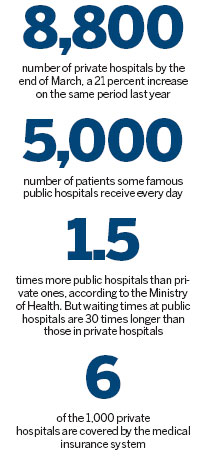Liu only needed to do a regular health check on that day and the doctor only saw her for 10 minutes. "But in Canada, even for a regular checkup, doctors will spend at least 20 minutes with a patient and they will provide very detailed information to patients."
The public maternity and children's hospital Liu attended receives more than 5,000 patients a day, and there is a line stretching back 200 meters from the window where patients have their blood tested every morning. A one-hour wait to have a blood test is normal.
According to the Ministry of Health, there are 1.5 times more public hospitals than private ones, however, waiting times at public hospitals are 30 times longer than private hospitals.
|
 |
Although many patients believe private hospitals provide more efficient service and have more experienced doctors they are too expensive and thus, out of reach for patients. Only six of the 1,000 private hospitals in Beijing are covered by the medical insurance system, and although private hospitals account for one-third of the hospitals in Beijing, they only cater to 12 percent of patients.
According to the Ministry of Health, China had more than 8,800 private hospitals in March this year, a 21 percent increase on the same period last year, while the number of State-owned hospitals fell by 3 percent during the past year.
The National Development and Reform Commission issued policies in May and December encouraging private domestic and overseas investors to set up medical institutions, including hospitals, clinics and health service centers at various levels.
Yet even though the government is showing a positive attitude towards private hospitals and clinics - State-owned hospitals can outsource some of their services to them - there are few official policies to support them.
Lack of support
The lack of support for private hospitals is the reason 50-year-old Huang Shu, a well-known spine surgeon who left a public hospital in northwest China in 2002 to set up a private hospital, said he regretted his decision.
"If I could make the choice again, I would definitely stay in the public hospital," he said.
His hospital, which provides his own unique treatment, receives around 300 patients every day, some of whom are from foreign countries - during our conversation, he received a phone call from an official from Australia who wanted to make an appointment - but even so, the hospital costs a lot to run. The rent for the four-story building is nearly 200 million yuan ($31.44 million) a year.
The Chaoyang district government has helped him find a new building that he will move his hospital to this year and has given him 70,000 yuan in financial support. Huang also operates two clinics in Indonesia and these help financially support his hospital in Beijing.
